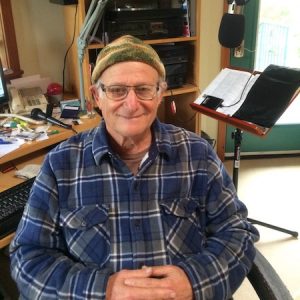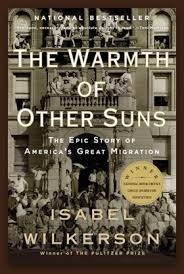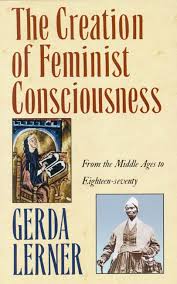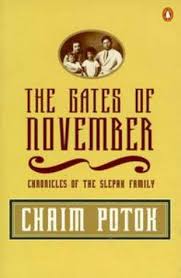“Our personal stories are among the most important things that we have.” Terry Gross (from an interview conducted by Barry Vogel, March 7, 1994)
“Curiosity,” says Barry Vogel, “has been a driving force in my life. If I want to know what’s happening, I’ll ask some questions about it.”
In fact, Vogel says, Radio Curious—and his decades of commitment to it—sprang from the inquisitive nature of his youth—from his mother’s teaching and the eureka moments in which he put those lessons to use.
Ask and the Door Will Open
In 1957, when Vogel had just started high school, his mother, Lillian Brown Vogel, enrolled in a doctoral program in clinical psychology and began dedicating evening hours to her studies. When Vogel asked what she was doing, she carefully explained the process of getting a Ph.D. Then, Vogel recalls, “In the vaguely snarky attitude of a 14-year-old, I said, ‘What makes you think you can do it?’ Her matter of fact answer was, ‘If somebody else can do it, there’s no reason why I can’t.’ And she proceeded to do just that—in the normal way of how she lived, doing all of the other things that she did as a professional and as my mother. It became clear to me that that mantra of hers was possible.”
A slightly older Vogel put that theory to work.
On a cross-country road trip in 1963, Vogel and his traveling partner ended up, early one morning, sitting in the parking lot of the Truman Library in Independence, Missouri, when they saw a man who looked like Truman enter the building. Vogel decided, despite his friend’s discouragement, that, if he found a Salvation Army store and purchased a suit, a white shirt, a tie and a pair of shoes, he just might secure an interview; and, soon, a suited-up Vogel entered the library. He told the guard that he was a political science student from San Francisco who was interested in interviewing Mr. Truman. An hour later, Vogel was directed to a private room, where, he did, in fact, end up talking with the former President.
Vogel concludes, “I [knew] [Truman] was not going to say, ‘Hey, you, kid sitting in that green VW bug, you want to ask me some questions….’ If I want to know something and I sit there listening, I don’t understand. If I ask, I open the door for the possibility of the answer….I have a whole new pathway to follow in my life.”
A Radio Life
Vogel’s childhood love of radio was fed, quite literally, by his family Sunday dinners. “At 6:00 PM, Walter Winchell would come on,” Vogel recalls, “and say, ‘Good Evening America! This is Walter Winchell speaking.’ When I heard that, I also smelled the roast beef cooking.” Then, Vogel continues, one Sunday, after the family had returned from a dinner party and there was no roast beef dinner, “Walter Winchell came on and I could still smell the beef. I could smell the beef wafting from the kitchen.”
Vogel’s first experience with regular radio programming came in 1964, when, while serving as a Peace Corps volunteer in Peru, Vogel hosted a weekly show featuring American music and topical conversations. Directed by the US Embassy—after making some skeptical comments regarding the 1965 US invasion of the Dominican Republic—to refrain from discussing political issues, Vogel responded that he had not given up his First Amendment rights when he joined the Peace Corps. He then scheduled an on-air discussion of the invasion, one that included the Peace Corps Director for Peru, members of a conservative Peruvian political party, and members of the local communist party. Censorship, Vogel recalls, was never again discussed.
Vogel didn’t return to radio broadcast until the early 1990’s when he volunteered with a group that was developing KCYX in California’s Mendocino County as a public station. A friend asked Vogel to join him in an on-air interview of Frank Riggs, a newly-elected maverick Republican candidate for the House of Representatives who had unexpectedly defeated the Democratic incumbent. The success of that experiment—the collaborations that followed—lay the foundation for Vogel’s eventual move to weekly, independent shows.
In 1990, Vogel began work on the program that would become his life’s work. Originally titled Government, Politics and Ideas, Vogel came to hear that name as “thud, thud, thud” and, in a 1994 interview with Terry Gross, proposed its more proper name: Radio Curious.
Now the rest is history, archived and documented by the Library of Congress.
(See accompanying story Pacifica Congratulates Barry Vogel as Radio Curious Is Invited into the Library of Congress)
What Lies Ahead
Currently, Vogel is closing up his 44-year Ukiah, California law practice. He plans to write a memoir, telling the stories of his clients and significant cases, a project, like his other endeavors, motivated still by his childhood curiosity.
“I’m thinking of these experiences, not just as law,” Vogel says, “but also about being curious.” He recalls, when he was 10, reading books about the Wright Brothers and Charles Darwin and thinking that, if someone were to write a memoir, he would have to save what was important to him. So, Vogel adds, “I have a lot of material which some people mischaracterize as junk. I remember being a teenager, but, when I go to the box of stuff,…I have a lot of information.”
And a wealth of material yet to explore.
Reading with Barry Vogel
On February 19 and April 18, 2018, I spoke with Barry Vogel, creator and host of “Radio Curious,” about his program, its acceptance into the Library of Congress, and his experiences as an attorney.
“I went to law school,” he says, “because I believe law is the most effective tool for social change.”
In his 48-year career, Vogel has fought to insure that pregnant women be legally informed of where a safe abortion might be obtained, that prisoners be guaranteed an administrative hearing before sentencing to solitary confinement, that tenants not be evicted without legal notice, that communities be protected from poisoning by helicopters spraying pesticide.
At the end of each “Radio Curious” interview, Vogel asks his guest to recommend a book.
It seemed only fitting, then, at the end of our conversation, to ask Vogel for his recommendations.
You can listen to Barry Vogel’s interviews with these authors in the Radio Curious archives.
The Warmth of Other Suns by Isabel Wilkerson
“Every high school student should read The Warmth of Other Suns: The Epic Story of America’s Great Migration by Isabel Wilkerson. This historical study talks about the 6 million Americans of black skin color who emigrated, if not fled for their lives, from the south between 1915 and 1970. Wilkerson follows several different people through three generations of migration. Their experiences and the suffering of people of color in our country are, I think, critical to a social understanding of the United States.”
http://www.radiocurious.org/2017/03/13/wilkerson-isabel-americas-great-migration-part-1-archive/
http://www.radiocurious.org/2017/03/21/wilkerson-isabel-americas-great-migration-part-2-archive/
The Creation of Feminist Consciousness by Gerda Lerner
“[Lerner] has been called the foremother of the academic genre of women’s studies. She emigrated to the United States fleeing what was about to be Nazi-occupied Austria when she was about 19. In the late 1940’s and early 1950’s, Lerner and her husband were involved with movies in Los Angeles and were threatened by the McCarthy and House Un-American Activities investigations. At about 40, she entered college and, in about 6 years, earned a doctorate from Columbia University. She started a genre [of women’s studies] that is only now coming to the forefront.”
http://www.radiocurious.org/2013/03/12/lerner-gerda-the-foremother-of-womens-history/
The Gates of November by Chaim Potok
“Potok is well-known for his fiction. But The Gates of November [non-fiction] talks about two generations of the Slepak family. The father escaped Russia and the pogroms, around 1910, and entered medical school in the United States. During the Bolshevik Revolution, he snuck back into Russia and ended up working at a high level in TASS [the Russian news agency]. His son, Volodya, became the Director of the Soviet radar system in the 50’s and 60’s around the time of the refuseniks [and eventually became active as a dissident. The story examines] the duality between the father and the son, the father’s staunch atheism and the son’s desire to connect with being Jewish. In many ways to me, there but for luck go I. My grandparents left Russia, right at the beginning of the twentieth century on my mother’s side and about 15 years before on my father’s side.”
http://www.radiocurious.org/1997/01/08/chaim-potok-escaping-communism/




